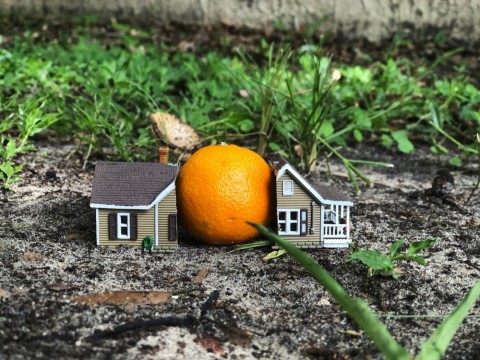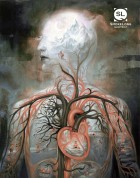We make pacts to lose our virginities together by taking a nail file and slicing, a whisper of a line, through our palms, bisecting the juncture where heart meets head. The wounds open wide, baring all, the salacious whores, and love and intellect will never again interact without that slim scar to remind us of pain.
The next boys to walk in, says our favourite brave idiot, the very next boys to walk into the bar will be the ones to whom we will gift our flowers.
Luckily, the next boys who walk into the bar, who step out of the day’s sunshine and into the pub’s cool gloom, are identical. Not so much boys as mere silhouettes of them, and this is just fine, for shadows mean nothing at all, really. Shadows are only the interruption of light.
We take the boys by their hands and we lead them out into the summer. We are delighted by the conditions; it is perfect weather for growth. We lead the boys, walking in twos, a little march of pairs like we are parading, a fitting celebration for such an occasion.
The garden to which we take the boys is unimpressive. Mostly grass, but what grass, so green, so lush, it is the richest grass in the world. This grass drinks champagne, this grass feeds on caviar and sunshine and this grass can speak fluent French, can order coq au vin in flawless French.
The boys say, Why are we here, and we only smile secret smiles and we each find a patch of earth, ungrassed. We slip our toes from stilettos and bury our feet. Stand in the soil. We say to the boys, each of them, respectively, we say, Now bury us! Bury our bodies in earth!
The boys laugh because they think we are joking but sex is no joke, not to us, we have been warned about gifting our flowers from birth. We have been spat at, sneered at, we have been called slut skank hoe whore hooker and we have been warned of the terrible diseases, the most terrible of all, of course, being fertilisation. It is so important not to give birth until one is allowed to give birth.
But now, we know, it is time. Bury us, we tell the boys, we are so ready to grow.
The boys shrug, their sex drive higher than their suspicions, and they cup their palms into bad little shovels and they begin to scoop, the world’s worst machinery, they scoop tiny piles of soil around our feet, ankles, calves. The day is fiery and the work is slow. The boys are sweating and we are hot. We are buried up to our knees when our favourite brave idiot says, Enough!
The boys stop, their muddy hands a disgrace. Their penises are free from constraint but the labour has softened their excitement and now those little fleshy hoses hang between their legs, wrinkled worms, and it is so hard not to feel superior.
Our favourite brave idiot says, Water! We need water! And the boys run off to find watering cans.
By the time they return, we have already begun to bloom. Sugars run up and down our trunks, groin to lip and back again, xylem and phloem, we are so sweet with our own made-in-house syrup. Leaves are sprouting from our biceps; buds are forming on our fingertips.
The boys watch in wonder. This is not what they were taught in health class, that’s for sure. This is what we were taught in poetry. The words of men have made us this way. Fruit grows heavy from our limbs. Pears and apples. The boys are so amazed but we have been compared to fruit all our lives.
It is when the buds break, split open wide like crude exhibitionists, bear their innards for all to see, it is then that the boys’ erections return. They want so badly to taste our sap, they want so much to finger our florets, fuck our flowers. But we don’t want them anymore. We shake our heads but our leaves only rustle, as if disrupted by a light breeze.
We try to push the boys away, but fruit only falls from our fingertips.
We say nothing as they prepare themselves for penetration. We cannot speak, for our mouths have hardened with bark and our bodies are wood and we can only wait. We wait as our limbs grow, gnarled and knobbed, our arms branch off into twigs. We grow into one another, the way close-standing trees do. Our branches wind, twirl, twist around sister branches and we are entwined and all of our arm-linking was training for this. Now, we are helixed as DNA and we are together and one and we are the strongest jungle.
By the time we feel phalluses against us, we are only flora. All of us, together, this small and lush forest, we have made this garden beautiful.
But, already, we can feel the termites moving in, scuttling up our thighs, torsos, necks. We can feel their sharp little teeth beginning to gnaw, chew, feast on our parts. Even the strongest trees can be destroyed from within, even the most fertile flesh will rot. These bodies cannot last.

Notes from Guest Reader James Tate Hill
‘We Lose Our Virginities’ is bold, inventive, polished, and it crackles with voice and imagery.


 The core workshop of SmokeLong Fitness is all in writing, so you can take part from anywhere at anytime. We are excited about creating a supportive, consistent and structured environment for flash writers to work on their craft in a community. We are thrilled and proud to say that our workshop participants have won, placed, or been listed in every major flash competition. Community works.
The core workshop of SmokeLong Fitness is all in writing, so you can take part from anywhere at anytime. We are excited about creating a supportive, consistent and structured environment for flash writers to work on their craft in a community. We are thrilled and proud to say that our workshop participants have won, placed, or been listed in every major flash competition. Community works.